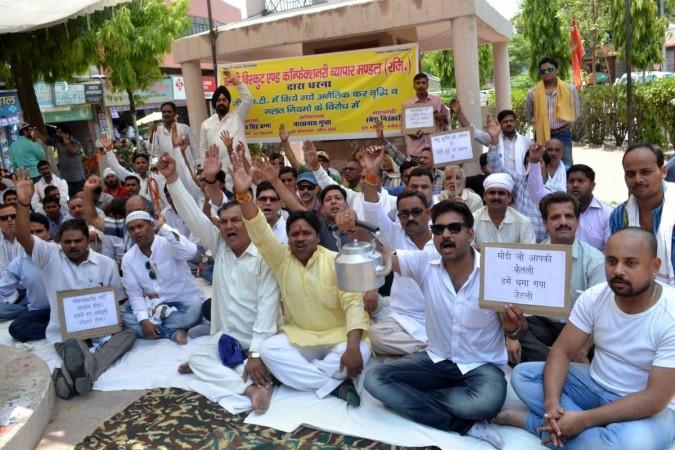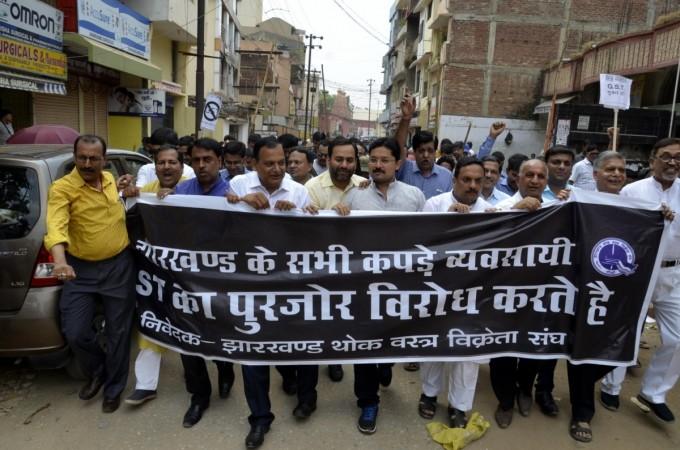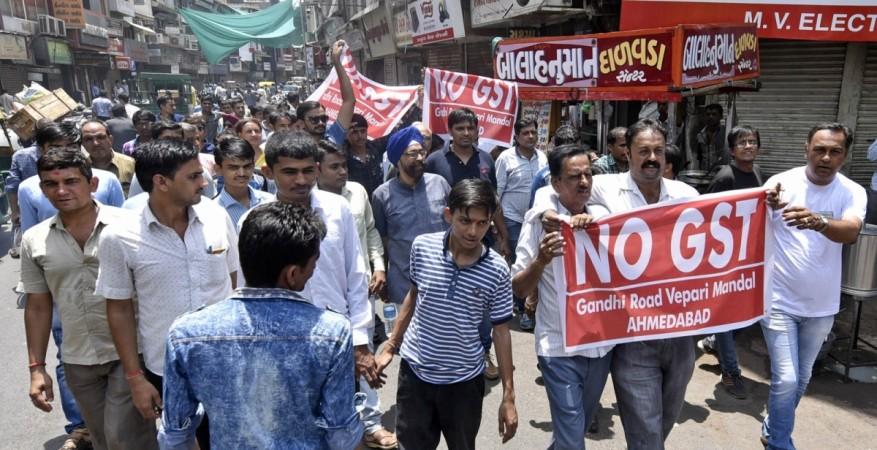
The country is all set to undergo a major shift in taxation with the implementation of the Goods and Services Tax (GST) reform from July 1. The reform will be launched by Prime Minister Narendra Modi at the Central Hall in Parliament in the presence of President Pranab Mukherjee on the midnight of June 30.
However, not everyone in the country seems to be happy with the reform. Textile traders, cloth merchants and firecracker manufacturers from across the country are protesting against the GST reform and carrying out strikes in several parts of the country.
On Thursday, textile traders and cloth merchants launched strikes in several places - Agra, Rajasthan, Telangana, Jamshedpur, Bathinda and Ahmedabad - to protest against the GST launch. Local traders in Agra decided to keep their businesses shut and also burn effigies of the GST. On Thursday, traders protested by reciting the Sundar Kand - part of epic Ramacharitmanas - for "purification of the mind and soul of Finance Minister Arun Jaitley."

A leader of the Agra traders, TN Agrawal, told India Today that "the funeral procession of GST will be taken out from the main Belanganj market of Agra and the effigy will be finally burned on a pyre at Mokshdham at Taj Ganj." He added that the businessmen of Agra would not seek registration under GST. They will work unregistered instead.
Cloth merchants in Agra said that cloth, which is free from VAT, has not been included under the GST which is why merchants have been protesting.
Similarly, over 5,000 textile traders in Jamshedpur observed a day-long strike wearing black badges on Thursday to protest against the 5 percent GST levied on textiles, the Avenue Mail reported. They also burnt clothes and organised a rally against the GST Council on the eve of the strike.
In fact, textile traders across the country are on a three-day strike from June 28-30 to protests against the GST Council's decision to levy five percent tax on the textile industry. They will reportedly go on an indefinite strike if the Centre does not agree to their demands at a meeting this week.
Around 40,000 shops in Telangana were also shut on Tuesday in support of the strike. "The cloth merchants from other places in the city have also observed the bandh. We are organising a rally against GST in the city on June 30. We will decide our next action after a meeting with office-bearers," TS Federation of Textile Association President Ammanabolu Prakash told Deccan Chronicle.
Rallies were also organised in several towns. The state of Rajasthan also saw similar protests. Around 250 shops in Bathinda in Punjab were also shut as a mark of protest. The price of textiles could increase by 8-10 percent for customers, the News Minute reported.

In Ahmedabad, the Gujarat Contractors Association (GCA) has decided to organise a 'mahasammelan' (mega gathering) on June 30 to protest against the GST reform and decide on the future course of action.
Textile traders in the city formed a 5 km-long human chain on Thursday raising concerns that not enough time had been given to them to get acquainted with the mega tax reform. Around 65,000 traders from Surat also showed solidarity by keeping their markets shut
Meanwhile, Tamil Nadu's firecracker manufacturing cluster around Sivakasi in the district of Virudhunagar has threatened to stop manufacturing by the end of June as a mark of protests against the 28 percent tax levied on fireworks, the Economic Times reported. They had been paying 14.5 percent of tax until now.








!['Lip lock, pressure, pyaar': Vidya Balan- Pratik Gandhi shine in non-judgmental infidelity romcom Do Aur Do Pyaar [ Review]](https://data1.ibtimes.co.in/en/full/797104/lip-lock-pressure-pyaar-vidya-balan-pratik-gandhi-shine-non-judgmental-infidelity-romcom.jpg?w=220&h=138)








